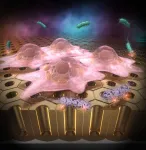Technological advances have led to the widespread use of electric devices and vehicles. These innovations are not only convenient but also environmentally friendly, offering an alternative to polluting fuel-driven machines. Lithium ion batteries (LIBs) are widely used in electrical appliances and vehicles. Commercial LIBs comprise an organic electrolyte solution, which is considered indispensable to make them energy efficient. However, ensuring safety becomes a concern and may be difficult to achieve with the rising market demand.
While solid-state batteries can help mitigate safety issues, the interface between solid electrodes and the electrolyte is not conducive to optimum lithium-ion transfer. Moreover, the expansion and shrinkage of solid electrodes can disrupt the joint interface and hamper ion transfer. Therefore, there is a need to develop efficient solid-state batteries with a stable joint interface that can enhance their safety, utility, and performance.
To overcome these challenges, a team of researchers from Japan has developed a non-flammable quasi-solid-state LIB that can overcome the limitations of conventional batteries. The study was led by Ryosuke Kido from Doshisha University and TDK Corporation, Japan, Professor Minoru Inaba and Professor Takayuki Doi from Doshisha University, and Atsushi Sano from TDK Corporation and their findings were published online on 11 October 2024, in the Journal of Energy Storage. It has also been published in the Volume 102 on 15 November 2024.
Giving further insight into their work, Mr. Kido the main author of the paper, says, “Increasing the capacity of positive and negative electrode active materials to achieve higher energy density reduces cycle performance and safety. The flame-retardant quasi-solid-state battery we developed, combining a liquid electrolyte and a solid electrolyte, provides a safer and more durable alternative to all-solid-state batteries with high energy density.”
The new battery design includes a silicon (Si) negative electrode and a LiNi0.8Co0.1Mn0.1O2 (NCM811) positive electrode, which is considered next-generation materials for LIBs. These electrodes are separated by a solid lithium-ion conducting glass ceramic sheet (LICGC™) from OHARA. To enhance compatibility and performance, the researchers developed non-flammable, nearly saturated electrolyte solutions tailored to each electrode. The solutions used tris(2,2,2-trifluoroethyl) phosphate and methyl 2,2,2-trifluoroethyl carbonate, which were compatible with the electrodes and the solid electrolyte interface. The resulting 30 mAh-class quasi-solid-state pouch cells demonstrated excellent ionic conductivity, thermal stability, and electrochemical performance.
The researchers went on to assess the thermal stability and electrochemical performance of the quasi-solid-state LIB using electrochemical impedance spectroscopy, charge-discharge tests, and accelerating rate calorimetry (ARC). Notably, the battery demonstrated high charge/discharge capacity with good cycle performance and little change in the internal resistance. Moreover, the ARC test revealed that the Si-LICGC-NCM811 structure with the respective electrolyte solutions showed improved thermal stability and that the heat generation associated with the side reaction was very low even in the high-temperature range of around 150 °C.
Overall, the newly developed LIB has the potential to enhance the development of efficient and safer next-generation electric vehicles and cordless appliances like drones. Its widespread application can not only improve user convenience but also promote sustainable economic growth.
Mr. Kido concludes with the long-term implications of their work by saying, “As the world moves toward carbon neutrality, electric vehicles have been gaining significant attention in recent years. It is vital to develop highly safe automotive batteries with extended lifespans. The quasi-solid-state battery from our study has the potential to improve the longevity of liquid-based LIBs and enhance energy density while maintaining the safety of all-solid-state batteries.”
The study represents a step toward developing next-generation energy storage solutions that balance safety, efficiency, and environmental sustainability.
About Ryosuke Kido from Doshisha University, Japan
Mr. Ryosuke Kido is a second-year doctoral fellow at the Faculty of Science and Engineering Department of Molecular Chemistry and Biochemistry, Doshisha University, Japan. His doctoral work is in collaboration with the Cell Engineering Section, Japan Battery Division, Energy Devices Business Group, TDK Corporation, Japan.
About Professor Takayuki Doi from Doshisha University, Japan
Takayuki Doi obtained his Ph.D. in Engineering from Kyoto University, Japan, in 2005. He joined Doshisha University, Japan, as an Associate Professor in 2013 and was promoted to full Professor in 2020. He specializes in material science, with a focus on nanomaterials, energy chemistry, inorganic compounds, and battery science. He has published over 130 papers on these topics.
Funding information
This research was partially supported by “Advanced Research Program for Energy and Environmental Technologies” from New Energy and Industrial Technology Development Organization (NEDO), Japan.
Media contact:
Organization for Research Initiatives & Development
Doshisha University
Kyotanabe, Kyoto 610-0394, JAPAN
E-mail:jt-ura@mail.doshisha.ac.jp
END




